Olga Fialka (1848-1930) was an Austro-Hungarian artist and matriarch of the Ferenczy family of artists. [1]
Olga Fialka (1848-1930) was an Austro-Hungarian artist and matriarch of the Ferenczy family of artists. [1]
Olga Fialka was born on 19 April 1848 in Theresienstadt. [2] She studied painting under Jan Matejko in Kraków. She went on to study under August Eisenmenger in Vienna. She created paintings and book illustrations. Around 1884 she married Károly Ferenczy with whom she had three children. Fialka turned her attention away from art and focused on raising her children. [3] The couple's first child Valér Ferenczy (1885-1954) became a painter and printmaker. In 1890 their twins were born. Béni Ferenczy (1890–1967) became a sculptor and Noémi Ferenczy (1890-1957) became a textile artist. [4]
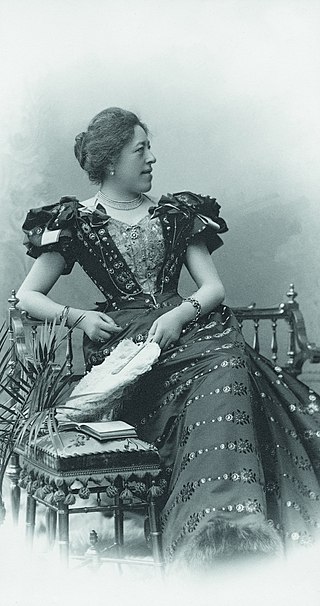
Olga Wisinger-Florian was an Austrian impressionist painter, mainly of landscapes and flower still life. She was a representative of the Austrian "Stimmungsimpressionismus", a loose group of Austrian impressionist painters that was considered avant-garde in the 1870s and 1880s.

Gyula Benczúr was a Hungarian painter and art teacher. An "outstanding exponent of academicism", he specialized in portraits and historical scenes. He is "considered one of the greatest Hungarian masters of historicism".

Simon Hollósy was a Hungarian painter. He was considered one of the greatest Hungarian representatives of 19th-century Naturalism and Realism.

Béni Ferenczy was a Hungarian sculptor, medalist and graphic artist.
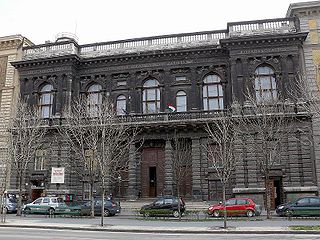
The Hungarian University of Fine Arts is the central Hungarian art school in Budapest, Andrássy Avenue. It was founded in 1871 as the Hungarian Royal Drawing School (Magyar Királyi Mintarajztanoda) and has been called University of Fine Arts since 2001.
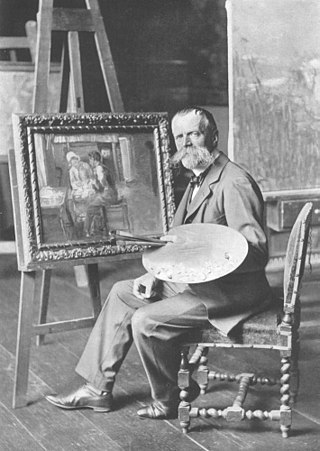
Fritz von Uhde was a German painter of genre and religious subjects. His style lay in-between Realism and Impressionism, he was once known as "Germany's outstanding impressionist" and he became one of the first painters to introduce plein-air painting in his country.
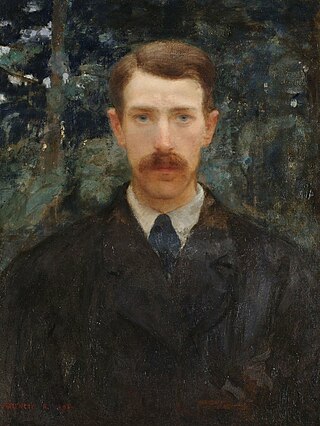
Károly Ferenczy was a Hungarian painter and leading member of the Nagybánya artists' colony.

János Thorma was a Hungarian painter. A representative figure of the Nagybánya artists' colony, which started in 1896, in Nagybánya, Austria-Hungary, he moved through different styles, shifted from the naturalism that was the aesthetic of the colony, to historical subjects, to romantic realism and to a Post-Impressionism style. His work is held by the Hungarian National Gallery, the Thorma János Múzeum, regional museums and private collectors.

István Réti was a Hungarian painter, professor, art historian and leading member, as well as a founder and theoretician, of the Nagybánya artists' colony, located in what is present-day Baia Mare, Romania. In addition, he served as president of the Hungarian University of Fine Arts (1927–1931) and (1932–1935).
Ferenci, Ferenczi, Ferenczy:

Emil Jakob Schindler was an Austrian landscape painter. His eldest daughter was the author and composer Alma Mahler.

Ida Krisztina Veronika Ferenczy de Vecseszék was a Hungarian noblewoman who served Empress Elisabeth of Austria as a lady-in-waiting—and favourite and confidant—from 1864 until the Empress' death in 1898.
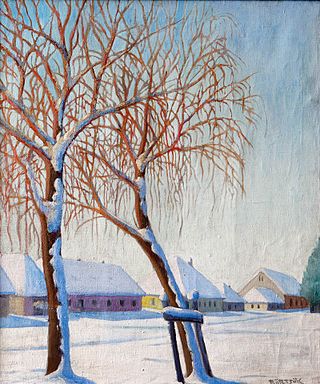
Samu Börtsök was a Hungarian landscape painter.

Countess Blanka Teleki de Szék was a Hungarian noblewoman, educator and women's rights activist. She is regarded as an early feminist and pioneer in the education of females.
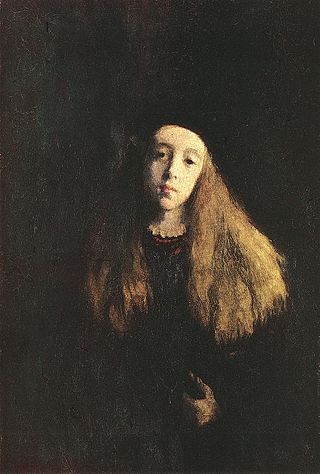
Noémi Ferenczy was a Hungarian artist, best known for her tapestry designs. She wove her own tapestries, and was influenced by the Nagybánya art movement.

Marie Müller was an Austrian portrait painter.

The Nagybánya artists' colony was an art colony in Nagybánya, a town in eastern Hungary that became Baia Mare in Romania after World War I. The colony started as a summer retreat for artists, mainly painters from Simon Hollósy's szabadiskola in Munich. The original group focused on plein-air painting.
Géza Kukán (1890–1936) was a Hungarian painter.